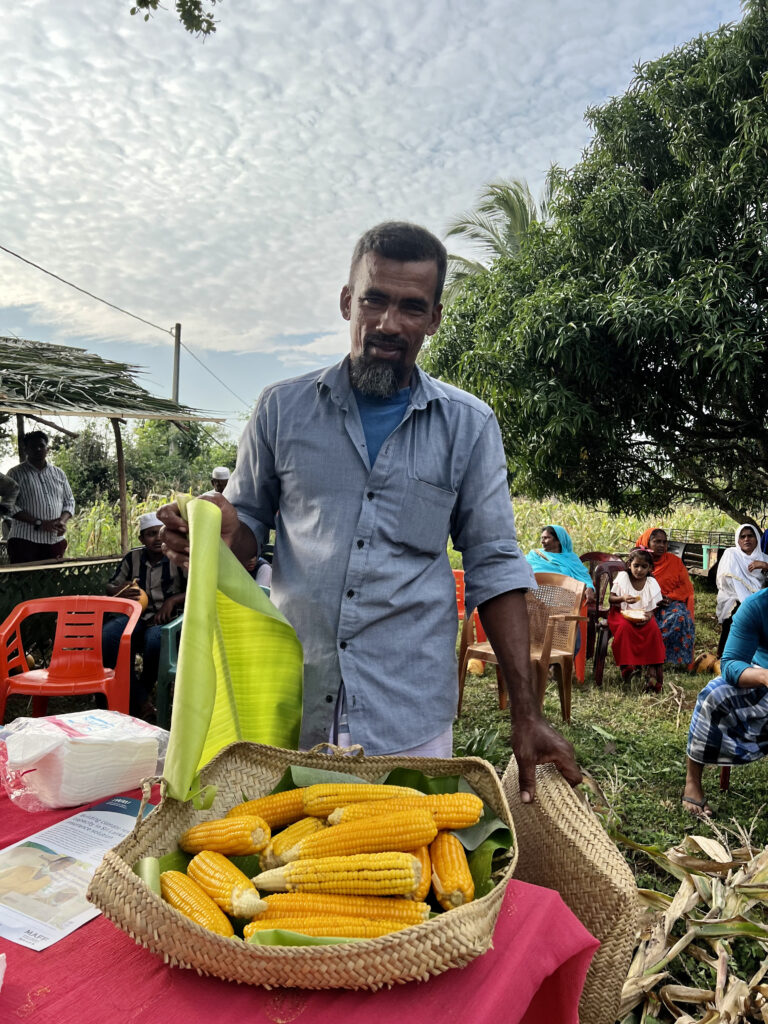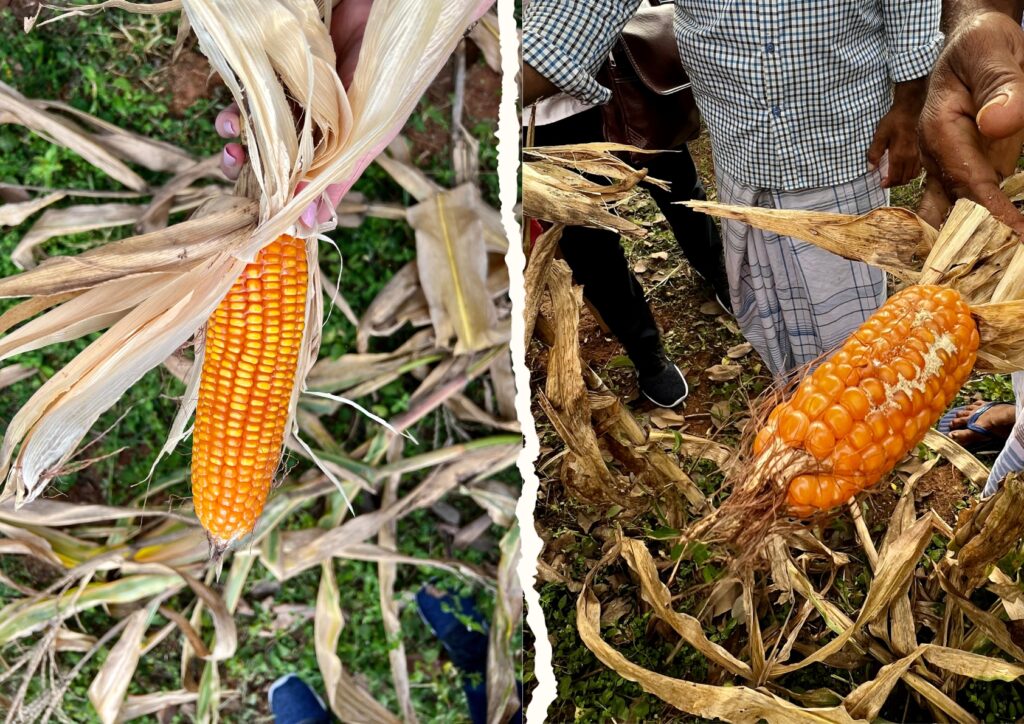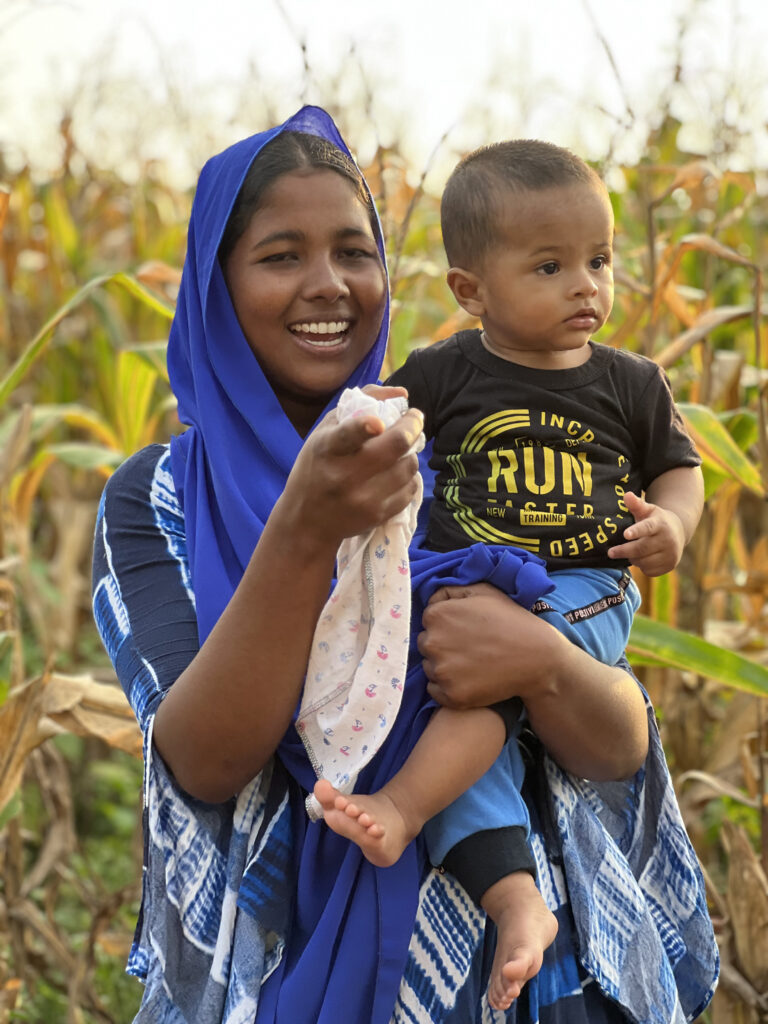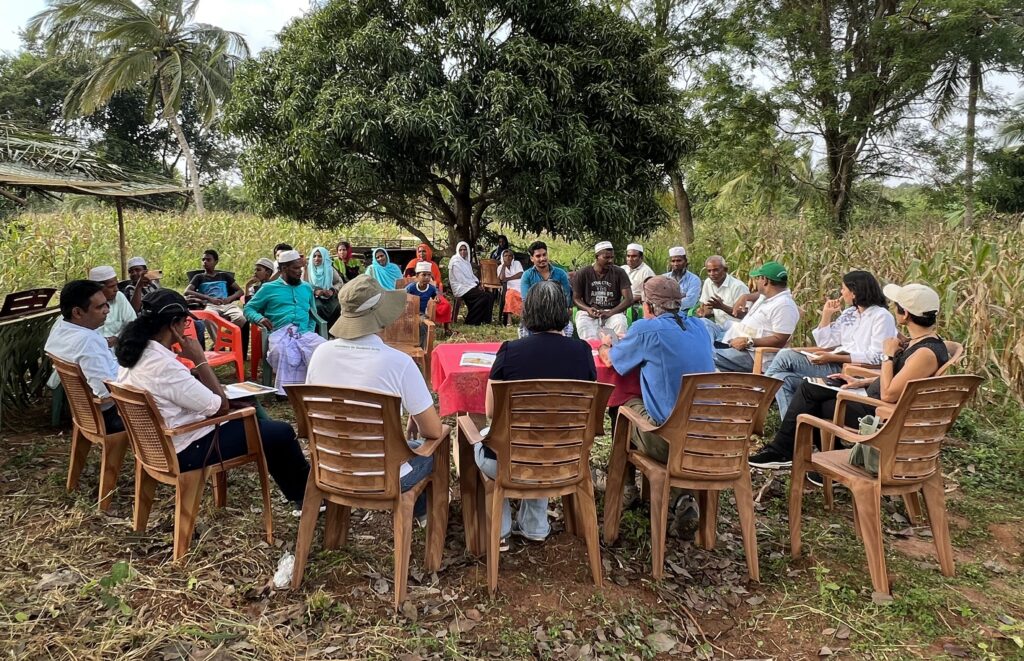By Juliana Knapp & Sushila De Silva

Photo: Juliana Knapp / IWMI
On the north-central plains of Sri Lanka, in the small rural village in Galenbindunuwewa, a community of maize farmers are reshaping their farming practices to respond to the growing challenges posed by climate change. They recently welcomed researchers from the International Water Management Institute (IWMI) and representatives from the United States Department of Agriculture (USDA) to share their experiences and aspirations, and to discuss climate-resilient solutions.
For almost two decades, these farmers have cultivated maize on rain-fed lands, facing the uncertainties of weather patterns ranging from droughts to unexpected heavy rainfall. Operating outside the organized irrigation systems, the only compensation previously available to them was for crop damage caused by elephants.
Over the past four years, IWMI’s innovative pilot project, Bundled Solutions with Climate Information and Seed Systems, or BICSA, has provided these farmers with vital support, including weather index insurance, agronomic advisories via SMS, climate-resistant seeds, and weather services. This comprehensive approach has been instrumental in helping farmers navigate these challenges and build resilience in their farming practices and has significantly shielded them from the economic impacts of moderate droughts.
While often plagued by droughts, a recent and unexpected deluge in January 2024 brought a new set of challenges. Mold and pests decimated 30% of their maize harvest, underscoring the importance of insurance payouts as a vital safety net. Looking ahead, these farmers aspire to diversify their crops beyond maize and improve water availability through agro-wells.

Photo: Juliana Knapp / IWMI
Enhancing resilience and productivity
Continued support from initiatives like CGIAR Climate Change, Agriculture and Food Security (CCAFS) and CGIAR Climate Resilience “ClimBeR,” is helping farmers pave the way for a more resilient and productive agricultural landscape in Sri Lanka.
“At IWMI, we champion bundling climate-smart solutions – including climate-resilient seeds, weather index insurance, and weather and agronomic advisories – to empower farmers,” explained Giriraj Amarnath, IWMI’s Research Group Leader, Water Risk to Development and Resilience. “This comprehensive approach builds their adaptive capacity, translates early warnings into proactive actions, and ultimately bolsters their livelihoods in the face of climate challenges.”
Smallholder farmers in Sri Lanka face significant vulnerability to climate shocks due to limited education, technical skills, and financial resources, hindering their ability to invest in climate adaptation. The fear of financial losses from poor harvests, combined with minimal savings, heightens this vulnerability. Insurance acts as a safety net, motivating farmers to explore strategies to mitigate risks and improve crop yields.
With the support of insurance, farmers are encouraged to seek innovative solutions to address climate challenges and enhance their agricultural output. They expressed confidence in expanding their crop variety and extending growing seasons through improved agricultural inputs, mechanization, and increased financial access. While currently focused on cultivating maize, they envision diversifying their crops throughout the year with the introduction of agro-wells.
Farmers also emphasized the need for tailored agromet services, high-quality seeds, and tools for climate-smart agriculture to boost productivity and resilience against climate change. They believe that these improvements could significantly enhance their yields in the face of climate change.
Farming in Galenbindunuwewa, however, is a family affair, and women have their own priorities. While men prioritize crop diversification and seasonal expansion, women emphasize the need for mechanized tools to streamline planting processes, allowing them more time for family care and household responsibilities.

Photo: Juliana Knapp / IWMI
Opportunities for growth and investment
To propel agricultural modernization for smallholder farmers in Sri Lanka, the adoption of climate-smart technologies, the strengthening of value chains, improved farmer-market linkages, and enhanced quality standards are essential. Initiatives like e-farmer, a crowd farming platform, aim to overcome challenges such as limited farmer access to finance and inadequate infrastructure.
Discussions explored intercropping and organic composting as avenues for agricultural growth. The USDA representatives showed keen interest in these practices, emphasizing the importance of nitrogen-fixing crops and essential raw materials like worms and soil for organic compost production. Utilizing leftover maize stalks, currently discarded as refuse, was proposed as a potential resource.
Moreover, there are openings for the private sector to participate by supplying high-quality seeds, improving value chains, establishing export networks, and providing tools for climate-smart agriculture such as solar pumps for agro-wells.
In Galenbindunuwewa, farmers currently sell their maize directly to the brewing industry or as cattle feed, bypassing the value chain. There is potential for them to diversify into value-added products. For instance, Kenya’s Maize Value Chain has boosted farmers’ income by streamlining postharvest processes.
Sri Lanka holds untapped export potential for various agricultural products in high demand globally, offering growth opportunities for farmers and investors. While the farmers of Galenbindunuwewa grow watermelon, groundnuts, and millet informally after the official planting season, they are unaware of higher-value crops like pomegranate, papaya, and moringa grown for export elsewhere in the country.
Farmers in different regions have successfully tapped into these markets, increasing income and breaking free from loan cycles. Some have adopted cost-effective technologies like solar pumps for irrigation, enhancing harvests. Through sustainable agriculture practices and collaboration, these farmers aim for a prosperous future by embracing climate-smart technologies, strengthening value chains, improving market connections, and upholding quality standards.
Ultimately, the concerted efforts of farmers, organizations, and stakeholders in Sri Lanka are shaping a sustainable and prosperous agricultural landscape through innovation, collaboration, and the adoption of climate-smart technologies.

Photo: Juliana Knapp / IWMI

